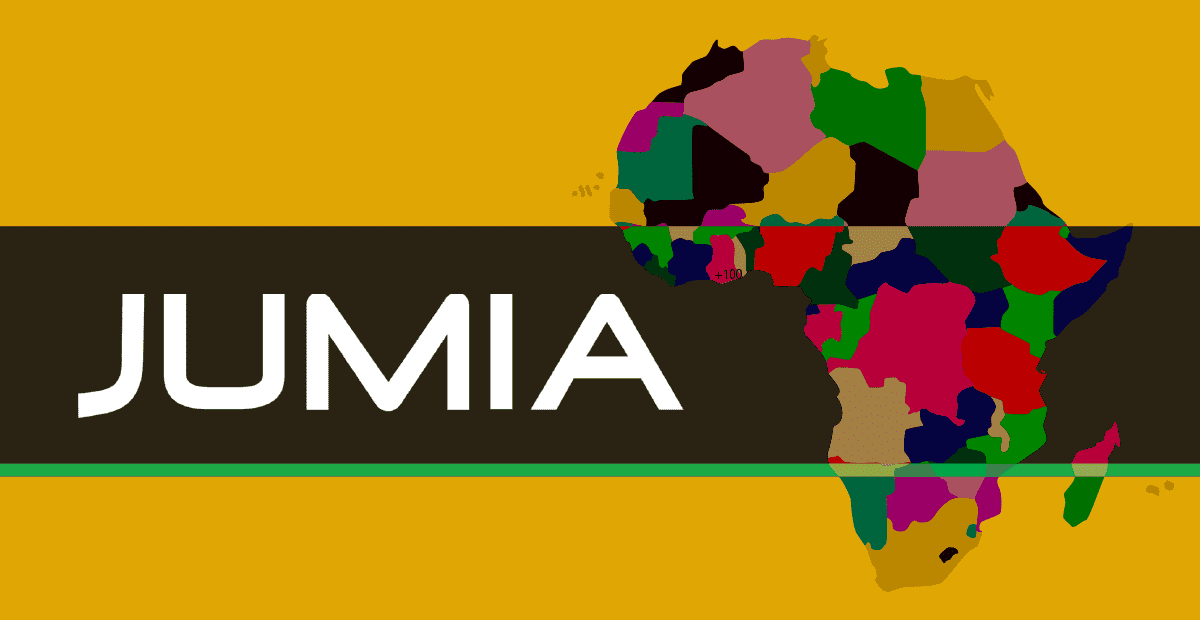このサイトは、私(@mifsee)が個人的に学びながら企業分析や銘柄分析を進め、その過程を記録としてまとめているものです。
あくまで個人の調査・整理を目的とした内容であり、誤りや実際と異なる情報が含まれる可能性があります。
また、MifseeではAI技術を活用した運用や、技術習得を目的とした実験的な取り組みも行っています。ご覧いただく際には、その点をご理解のうえご利用ください。
- はじめに
- ジュミア・テクノロジーズ(JMIA)とは何の会社?
- ジュミア・テクノロジーズ(JMIA)はどのような事業をしている?
- JMIAはアフリカ大陸の何カ国で事業を展開している?
- ジュミア・テクノロジーズ(JMIA)がアフリカのアリババと言われる理由は?
- ジュミア・テクノロジーズ(JMIA)は何がすごい?
- ジュミア・テクノロジーズ(JMIA)の設立背景は?
- 取引市場は?
- ジュミア・テクノロジーズ(JMIA)のセクター、業種、属するテーマは?
- 配当は?
- ジュミア・テクノロジーズ(JMIA)が属する業界の規模と成長性は?
- ジュミア・テクノロジーズ(JMIA)の競合企業は?
- ジュミア・テクノロジーズ(JMIA)の競合との差別化要素と優位性は?
- ジュミアの成長戦略とビジョンは何ですか?
- ジュミア・テクノロジーズ(JMIA)の業績について
- ジュミア・テクノロジーズ(JMIA)の株価
- ジュミア・テクノロジーズ(JMIA)の将来生は?今後の展開は?
- ジュミア・テクノロジーズ(JMIA)の2024年度Q2決算サマリー
- ジュミア・テクノロジーズ(JMIA)の2024年度Q3決算サマリー
- ジュミア・テクノロジーズ(JMIA)の2025年Q1決算サマリー
- ジュミア・テクノロジーズ(JMIA)の2025年Q2決算サマリー
- ジュミア・テクノロジーズ(JMIA)の株を買える証券会社は?
- まとめ
はじめに
ジュミア・テクノロジーズ(Jumia Technologies)は、アフリカを中心に展開するEコマースプラットフォーム企業です。オンラインマーケットプレイスに加え、物流ネットワークやデジタル決済サービス(JumiaPay)を提供し、インターネット普及と都市化が進むアフリカ市場で存在感を高めています。
同社は2019年に上場し、「アフリカのアマゾン」として国際的な注目を集めました。人口増加やスマートフォン利用の拡大により、Eコマース需要は急成長が見込まれており、ジュミアはその成長ストーリーの中心的存在と目されています。
個人的には、アフリカ市場を投資対象としてあまり注目していませんでしたが、ジュミア・テクノロジーズが徐々に注目を集め、その名前を見る機会が増えてきました。
アフリカ市場で巧みに進出し、驚異的な成長を遂げているeコマース企業「ジュミア・テクノロジーズ(JMIA)」について、その事業内容、独自の強み、そして将来性について詳しく見ていきます。
ジュミア・テクノロジーズ(JMIA)とは何の会社?
ジュミア・テクノロジーズ(Jumia Technologies AG)は、アフリカ諸国でEコマースを中心に事業を展開するテクノロジー企業。
2012年にナイジェリアで創業され、当初はRocket Internetの支援を受けながら成長を遂げ、現在はドイツに本社を置きつつ、ナイジェリア、エジプト、ケニア、南アフリカなど複数の国でサービスを提供している。
同社のミッションは「アフリカの人々の生活をより簡単に、より良くする」ことであり、オンラインショッピングを通じて商品・サービスのアクセス向上を目指している。
アフリカでは物流インフラや銀行口座普及率の低さが課題となる中、ジュミアはマーケットプレイスに加えて物流・倉庫・配送、さらにオンライン決済のJumiaPayまで一貫して提供することで、Eコマース普及のボトルネックを解消している。
対象市場は、急速に成長するアフリカの中間所得層を中心に、都市部の若年層やスマートフォンユーザーがメインである。
提供サービスの特徴は、現地言語対応、現地通貨決済、ラストワンマイル配送など地域特性に合わせた運営にある。
ジュミアは、アフリカのアリババ、アフリカのアマゾンとも言われ、そのビジネスモデルが類似しており、アフリカ市場での成功を目指している。
ジュミア・テクノロジーズ(JMIA)の企業情報は以下の通り。
- 会社名: Jumia Technologies AG
- 設立年: 2012年
- 本社所在地: ベルリン(ドイツ)
- 代表者: フランシス・ドゥフォー、アントワーヌ・メイラン(共同CEO)
- 公式サイト: https://group.jumia.com/
- 主な事業内容: Eコマースプラットフォーム運営、物流サービス(Jumia Logistics)、デジタル決済(JumiaPay)
ジュミア・テクノロジーズ(JMIA)はどのような事業をしている?
ジュミア・テクノロジーズ(JMIA)は、アフリカを中心に展開する総合的なeコマース企業であり、以下のような主要な事業を行っている。
マーケットプレイス(Jumia Marketplace)
ジュミアのオンラインマーケットプレイスは、消費者と販売者を結びつけるプラットフォーム。
このマーケットプレイスでは、以下のような幅広いカテゴリーの商品が取り扱われている。
- ファッション
- エレクトロニクス
- 家庭用品
- 食品
- 美容製品
このプラットフォームは、消費者が簡単に商品を検索し、購入できるように設計されている。
ジュミアロジスティクス(物流サービス:Jumia Logistics)
ジュミアは自社の物流サービス「ジュミアロジスティクス」を運営している。
このサービスは、販売者から消費者への商品配送を効率的に行うためのもの。
ジュミアロジスティクスは、以下のような機能を提供している。
- 倉庫の運営
- 配送センターの運営
- 地域の物流パートナーとの連携
これにより、迅速かつ確実な商品配送が可能となっている。
ジュミアペイ(決済サービス:JumiaPay)
ジュミアペイは、ジュミアの電子決済サービス。
このサービスは、安全で迅速なオンライン決済をサポートし、ユーザーの利便性を向上させ、銀行口座を持たない顧客層にも対応できるモバイルマネー連携がある。
- オンライン決済
- 携帯電話のチャージ
- 公共料金の支払い
- モバイルウォレット機能
- 分割払いやBNPL(Buy Now Pay Later)対応
ジュミアペイは、ジュミアのeコマースプラットフォームと密接に連携しており、ユーザーがスムーズに取引を行えるようにしている。
ジュミアフード(JumiaFood)
ジュミアフードは、食品や飲料のデリバリーサービス。
このサービスを通じて、ユーザーはレストランや食料品店から食品を注文し、自宅まで配送してもらうことができる。ジュミアフードは、特に都市部での需要に応えている。
- デリバリー手数料: このサービスでは、レストランや食料品店からのデリバリー注文に対して手数料を徴収している。
広告およびプロモーション
ジュミアは、販売者に対して広告スペースやプロモーションサービスを提供し、追加収益を得ている。
- プロモーションパッケージ:販売者は、ジュミアのプラットフォーム上で自社商品の露出を増やすためのプロモーションパッケージを購入できる。
その他のサービス
ジュミアは、上記の主要事業に加えて、以下のような追加サービスも提供している。
- 旅行予約サービス
- 求人情報サービス
- 不動産リスティングサービス
これらのサービスは、ジュミアのプラットフォームを通じて、ユーザーの日常生活をサポートしている。これらのサービスを通じて、複数の収益源を確保し、ビジネスの安定性を高めている。
ジュミアは、これらの多様な事業を通じて、アフリカ市場におけるeコマースのリーダーとしての地位を確立している。
地域の特性に合わせたビジネスモデルで急成長を遂げ、今後も成長が期待される企業として注目されている。
JMIAはアフリカ大陸の何カ国で事業を展開している?
かつてジュミア・テクノロジーズはアフリカ11カ国で事業を展開していたが、2022年以降の事業再編により複数市場から撤退した。2025年現在では9カ国に事業を集約している。
現在、ジュミアが事業を展開している国々
- ナイジェリア
- エジプト
- ケニア
- 南アフリカ
- モロッコ
- コートジボワール
- ガーナ
- セネガル
- ウガンダ
撤退済みの国としては、チュニジア、アルジェリアなどがある。
これら9か国の合計人口は約6億人であり、アフリカ全体の約15億人のうち40%前後を占める。
ジュミアは、これらの市場でのプレゼンスを活かし、経済的な多様化とスケールメリットを追求している。
ジュミア・テクノロジーズ(JMIA)がアフリカのアリババと言われる理由は?
ジュミア・テクノロジーズ(JMIA)がしばしば「アフリカのアリババ」と形容される背景には、以下のような類似点と戦略が存在する。
- マーケットプレイス機能の類似性:ジュミアはアリババ同様に、消費者と販売者を結ぶオンラインマーケットプレイスを提供している。複数カテゴリにまたがる幅広い商品ラインアップと、多様な出品者を支えるプラットフォーム構造が共通点である。
- 物流基盤の構築:アリババが「菜鳥網絡(Cainiao Network)」などを通じて物流を強化するのと同様、ジュミアもJumia Logisticsを通して自社倉庫や配送網を構築しており、物流を事業の柱に据えている。
- フィンテック・決済サービスの提供:アリババが「Alipay」でオンライン決済を支えるのに対し、ジュミアはJumiaPayを通じて安全かつ迅速な決済手段を提供し、EC取引を包括的にサポートしている。
- 成長市場におけるスケール志向:アリババが中国市場で爆発的な成長を遂げたように、ジュミアもアフリカ市場の高い成長可能性を背景に、事業拡大を図っている。特に都市化やインターネット普及の進展に伴って、アフリカのEコマースは成長余地を残している点で類似している。
- 戦略的再編と集中戦略:アリババが多角的戦略と巨大投資で市場優位を築いたように、ジュミアも非収益市場からの撤退と事業再編を進め、主要市場に資源を集中させることで、持続可能な収益構造への移行を図っている。特に近年では、事業を9か国に絞り込むなど、再構築を進めている。
以上のように、ジュミアはアリババと同様の事業構成(マーケットプレイス、物流、決済)を持ち、成長市場でスケーラブルな戦略を追求している点で「アフリカのアリババ」としばしば比較される。
ただし、アリババのような巨大な資本力や広範な国際展開とは異なり、アフリカ市場に特化した最適化型モデルを構築している点に注目すべきである。
比較がなされている。
ジュミア・テクノロジーズ(JMIA)は何がすごい?
ジュミア・テクノロジーズ(JMIA)のすごさは、単なるEコマース企業にとどまらず、アフリカのデジタル経済そのものを押し上げている点にある。アフリカの9カ国に事業を集約し、マーケットプレイス、物流、決済を一体化させた総合プラットフォームを運営しており、消費者には幅広い商品へのアクセスを、販売者には広大な市場への販路を提供している。
この双方向の仕組みは、購買機会を拡大するだけでなく、雇用や流通の改善にもつながっている。物流面では、自社運営のジュミアロジスティクスが倉庫からラストワンマイルまでをカバーし、配送の信頼性と効率性を高めている。
決済面ではジュミアペイが現金決済中心の市場にキャッシュレス化を浸透させ、安全で便利な取引環境を整えているのも大きな強みだ。
アフリカ市場に早くから参入した先行者としての優位性を活かし、インターネット普及率の上昇や若年人口の多さといった追い風を捉え、地域ごとの言語や文化に根差したマーケティングを展開しているため、現地消費者から「身近で信頼できるブランド」として受け入れられている。
さらに、地元の物流・技術パートナーと提携し、インフラを補完しながら事業の持続性と拡張性を両立させている点も評価できる。こうした戦略の積み重ねによって、ジュミアはアフリカ経済のデジタル化を象徴する存在へと成長しつつあり、急拡大する市場で揺るぎない地位を築きつつある。
ジュミア・テクノロジーズ(JMIA)の設立背景は?
ジュミア・テクノロジーズ(JMIA)は、2012年に設立され、その設立背景には、アフリカの急速な経済成長とデジタル化の進展が大きく関与している。
ジュミアは、アフリカのeコマース市場の未開拓な潜在力を見越して設立された企業である。
設立者と初期の目標
ジュミアは、サシ・オークランド(Sacha Poignonnec)とジェレミー・ホッダラ(Jeremy Hodara)によって創立。両名はともにマッキンゼー出身のコンサルタントであり、彼らはアフリカ市場の可能性を見出し、地域の消費者にオンラインショッピングの利便性を提供することを目指した。
設立背景
- アフリカ市場のポテンシャル: アフリカは若年層が多く、インターネットとモバイルデバイスの普及が急速に進んでいた。これにより、eコマース市場の成長が見込まれ、ジュミアの設立者たちは、この成長機会を活用し、アフリカの消費者に幅広い商品とサービスを提供することを計画した。
- 物流と決済のインフラ不足: アフリカでは物流と決済のインフラが十分に整っておらず、多くの地域で効率的な商品配送や安全なオンライン決済が困難でした。ジュミアは、これらの課題に対処するために、自社の物流ネットワークと電子決済システム(ジュミアペイ)を開発した。
- 経済的多様化のニーズ: 多くのアフリカ諸国は、経済的多様化を進めるために新しい産業の成長を奨励していた。ジュミアは、eコマースを通じて地元の経済を活性化し、新しい雇用機会を創出することを目指した。
初期の発展とパートナーシップ
ジュミアは設立後、迅速に事業を拡大し、ナイジェリア、エジプト、ケニア、南アフリカなどの主要市場に進出。また、初期の段階で多くの戦略的パートナーシップを結び、地域の物流企業や技術パートナーと協力してインフラを強化した。
ジュミアの設立背景には、アフリカのデジタル経済の発展とそれに伴う消費者ニーズの変化が大きく関与している。
取引市場は?
- 上場取引所: ニューヨーク証券取引所(NYSE)
- ティッカーシンボル: JMIA
- 上場日: 2019年4月12日
ジュミアのニューヨーク証券取引所への上場は、アフリカのeコマース企業として初めてのものであり、国際的な注目を集めた。
ジュミア・テクノロジーズ(JMIA)のセクター、業種、属するテーマは?
セクター
一般消費財(Consumer Discretionary): ジュミア・テクノロジーズは、一般消費財セクターに属している。このセクターは、消費者の裁量による支出を主に対象としており、電子商取引や小売業などが含まれる。ジュミアは、アフリカ全土で消費者がオンラインで商品を購入するためのプラットフォームを提供しており、消費者のライフスタイルや購買行動の変化に対応している。
業種
インターネット小売業(Internet Retail): ジュミアはインターネット小売業に分類される。この業種は、オンラインプラットフォームを通じて製品やサービスを販売する企業で構成されている。ジュミアのマーケットプレイスでは、ファッション、エレクトロニクス、家庭用品、食品、美容製品など、幅広いカテゴリーの商品が取り扱われており、アフリカの消費者に利便性と選択肢を提供している。
属するテーマ
eコマースとデジタルトランスフォーメーション: ジュミアの事業は、eコマースとデジタルトランスフォーメーションに特化している。このテーマは、デジタル技術を活用して従来のビジネスプロセスを革新し、オンライン取引の拡大を目指すもの。ジュミアは、アフリカ市場におけるインターネット普及率の上昇とモバイルデバイスの増加を背景に、eコマースプラットフォームを提供し、地域の経済発展に貢献、ジュミアロジスティクスやジュミアペイなどのサービスを通じて、効率的な物流と安全な決済を実現し、消費者のデジタル化を推進している。
配当は?
ジュミア・テクノロジーズは、配当を支払っていない。
同社の事業戦略と財務構造の一環として、利益を再投資し事業拡大に注力している。
ジュミア・テクノロジーズ(JMIA)が属する業界の規模と成長性は?
ジュミア・テクノロジーズ(JMIA)が属する業界は、アフリカのeコマース市場であり、この市場の規模と成長性については以下。
市場規模
アフリカ全体のEコマース市場は急速に拡大中であり、2024年には市場規模が約 3,170億米ドル に達し、2033年には 1兆1,017億米ドル にまで成長すると予測されています。これは 年間平均成長率(CAGR)が13.8% と見込まれている結果です。
別のデータでは、2025年時点で Eコマース市場全体の売上は約 404.9億米ドル と推定されており、2029年には 560.3億米ドル にまで拡大し、CAGRは 8.46%と見られています。
また、ソーシャルコマース(SNS経由の購買)の分野においても成長が著しく、2021年から2024年にかけては 38.4% のCAGR、2025~2030年には 16.2%の成長により、2025年の市場規模は 44.5億米ドル に達する見込みです。
2030年には 94.3億米ドルに拡大するとされています。
成長要因
- インターネット普及率の向上: アフリカではインターネットの普及が急速に進んでおり、2020年にはインターネットユーザーの数が約4億人に達した。これは全人口の約40%に相当し、インターネット普及率の向上は、eコマース市場の成長を大きく後押ししている。
- スマートフォンの普及: スマートフォンの普及もeコマース市場の成長を支えている。アフリカでは多くの人々が初めてインターネットにアクセスする手段としてスマートフォンを利用している。これにより、オンラインショッピングが手軽に行えるようになり、eコマース市場の拡大に寄与している。
- 都市化の進展: 都市化が進むことで、物流インフラや支払いシステムが整備され、eコマースの利用が促進されている。都市部では中産階級の増加に伴い、消費力も高まっており、これが市場の成長を支えている。
成長性
アフリカのeコマース市場は、以下の要因により今後も高い成長性が期待されている。
- 若年人口の多さ: アフリカは世界で最も若い大陸であり、約60%が25歳未満。この若年層はデジタル技術に精通しており、eコマースの主要な顧客層となっている。
- デジタル決済の拡大: モバイルマネーや電子決済サービスの普及が進んでおり、現金取引からデジタル決済への移行が進んでいる。これにより、オンラインショッピングがより便利になり、eコマース市場の成長を促進している。
- 国際的な投資の増加: 多くの国際的な投資家がアフリカのeコマース市場に注目しており、ジュミアのような企業への資金投入が増えている。これにより、インフラの整備やサービスの拡充が進んでいる。
総じて、アフリカのeコマース市場は急成長しており、今後も高い成長率を維持すると期待されている。ジュミア・テクノロジーズは、この市場のリーダーとして、さらなる拡大と成長が見込まれている。
ジュミア・テクノロジーズ(JMIA)の競合企業は?
ジュミア・テクノロジーズ(JMIA)の競合企業は、アフリカのeコマース市場において、複数の主要プレイヤーが存在している。以下に、主要な競合企業を挙げて、それぞれの特徴とジュミアとの競争関係を説明します。
Konga
Kongaは、ナイジェリアを拠点とするeコマース企業で、ジュミアの直接的な競合企業の一つ。
- ファッション、電子機器、家庭用品など、幅広い商品カテゴリーを取り扱っている。
- KongaPayという独自の電子決済システムを持ち、迅速な配送サービスを提供している。
Takealot
南アフリカを拠点とするTakealotは、アフリカで最大のオンライン小売業者の一つ。
- 多様な商品カテゴリーを提供し、特に南アフリカ市場で強いプレゼンスを持つ。
- 効率的な物流システムと優れたカスタマーサービスで知られている。
Kilimall
ケニアを拠点とするKilimallは、東アフリカ地域で大きなシェアを持つeコマース企業。
- 中国と緊密な関係を持ち、手頃な価格で多様な商品を提供している。
- 地元の物流ネットワークを強化し、迅速な配送を実現している。
Masoko
ケニアの通信会社サファリコム(Safaricom)が運営するeコマースプラットフォーム。
- M-Pesaという広く普及したモバイル決済システムと統合されている。
- 通信インフラを活用して、強力な顧客基盤と物流ネットワークを持つ。
AlibabaとAliexpress
アリババグループは、中国を拠点とするグローバルなeコマース巨人であり、Aliexpressを通じてアフリカ市場にも影響を及ぼしている。
- 広範な商品ラインナップと競争力のある価格。
- 効率的なグローバル配送ネットワークを持つ。
ジュミア・テクノロジーズ(JMIA)の競合との差別化要素と優位性は?
ジュミア・テクノロジーズ(JMIA)は、アフリカのeコマース市場で競合他社との差別化要素と優位性を持っている。以下は、ジュミアの主要な差別化要素と競争優位性。
差別化要素
- 地域特化のアプローチ: ジュミアは、アフリカ市場に特化したビジネスモデルを展開し、各国の文化や消費者のニーズに合わせたサービスを提供。地域ごとのマーケティング戦略を実施しており、地元の消費者との強固な信頼関係を築いている。
- 統合された物流と決済システム: ジュミアロジスティクスは、アフリカ全土に広がる物流ネットワークを持ち、迅速かつ効率的な商品配送を実現。また、ジュミアペイという独自の電子決済システムを提供し、安全で便利なオンライン決済をサポートしている。これにより、消費者の購入体験が向上している。
- 幅広い商品カテゴリー: ジュミアのマーケットプレイスでは、ファッション、エレクトロニクス、家庭用品、食品、美容製品など、幅広い商品カテゴリーを取り扱っており、、さまざまな消費者のニーズに対応している。
優位性
- 強力なパートナーシップ: ジュミアは、地域の物流パートナーや技術パートナーと強力な協力関係を築いている。これにより、インフラの整備やサービスの拡充が進み、競争力を高めている。
- ブランド認知度と信頼性: ジュミアは「アフリカのアリババ」として知られ、アフリカ市場におけるトップブランドとしての地位を確立している。消費者の間で高いブランド認知度と信頼性を持っており、これが競合他社との差別化に貢献している。
- イノベーションと技術力: ジュミアは、技術革新を通じて競争優位性を維持している。例えば、ジュミアペイやジュミアロジスティクスなどのサービスは、最新の技術を活用して消費者と販売者の利便性を高め、競合他社に対する技術的な優位性を持っている。
これらの要素により、ジュミア・テクノロジーズはアフリカのeコマース市場で強力な競争優位性を保持し続けている。
ジュミアの成長戦略とビジョンは何ですか?
ジュミア・テクノロジーズ(JMIA)の成長戦略とビジョンは、アフリカのデジタル経済を推進し、地域の消費者と企業に新しい価値を提供することに焦点を当てている。
成長戦略
- ジュミアは、アフリカ全土でのオンラインマーケットプレイスの拡大を目指している。これには、新しい商品カテゴリの追加や、既存のカテゴリーを強化することで、消費者が求める多様な商品を提供し、ユーザー基盤の拡大を図っている。
- ジュミアは、効率的な物流ネットワークを構築することで、商品配送のスピードと信頼性を向上させている。自社の物流センターの拡充や地域の物流パートナーとの連携を強化し、配送インフラの最適化を進めている。
- 電子決済サービスとして、ジュミアペイの普及を目指しており、より多くの取引をオンラインで安全に行えるようにしている。これにより、キャッシュレス化を促進し、消費者と販売者の利便性を高めている。
- ジュミアは、各国の市場特性や消費者行動に合わせたマーケティング戦略を展開している。ローカライズされたプロモーションや広告キャンペーンを通じて、ブランド認知度を高め、消費者との信頼関係を築いている。
- ジュミアは、地域の企業や国際的な投資家とのパートナーシップを通じて、事業拡大を加速させており、物流、技術、金融サービスなどの分野での提携が含まれる。
ビジョン
ジュミアのビジョンは、アフリカのデジタル経済の発展に寄与し、消費者と企業に新しい価値を提供すること。具体的には、以下のような目標を掲げている。
- デジタルインフラの構築: アフリカ全土でのインターネットアクセスとデジタル技術の普及を推進し、デジタルインフラを整備することで、より多くの人々がオンラインショッピングの利便性を享受できるようにすることを目指している。
- 経済成長と雇用創出: ジュミアは、地域経済の成長を促進し、新しい雇用機会を創出することを目指している。地元の企業や中小企業がオンライン市場に参入することで、経済の多様化と発展を支援している。
- 持続可能な成長: ジュミアは、持続可能な成長を追求し、環境に配慮したビジネスモデルを構築している。リサイクル可能なパッケージの使用や、効率的な物流ネットワークの運営を通じて、環境負荷の低減に取り組んでいる。
ジュミアの成長戦略とビジョンは、アフリカのデジタル経済を牽引し、地域社会にポジティブな影響を与えることを目指している。
ジュミア・テクノロジーズ(JMIA)の業績について
ジュミア・テクノロジーズ(JMIA)の財務年度は12月31日に終了し、その四半期決算は以下のスケジュールで発表されている。
- 第1四半期決算(5月初め頃):第1四半期の業績は、通常、前年度末からの新年の販売動向や、マーケットプレイスの成長、物流サービスの効率性などに焦点を当てている。
- 第2四半期決算(8月初め頃):第2四半期の決算報告には、ジュミアの主要なセールイベントや、季節的な売上動向が反映される。
- 第3四半期決算(11月初め頃):第3四半期の決算報告は、年末商戦に向けた準備や、ホリデーシーズンの売上予測が含まれる。
- 第4四半期および通期決算(2月初め頃):第4四半期および通期決算は、ホリデーシーズンの売上実績や、年間を通じた成長戦略の成果がまとめられる。
まずは、ジュミア・テクノロジーズ(JMIA)の最低限の業績分析を行なうための、以下の4つの指標を確認していきます。
- 売上:企業の業績と成長しているかを見る指標。
- 営業キャッシュフローと営業キャッシュフローマージン:企業がサービスからどれくらい現金を生み出しているかを見る指標。マージンはその比率で15%あると優良とされる。
- 営業利益:企業が主力の事業で稼いだ利益。企業の業績を評価する指標。
- EPS:1株当たり純利益で企業の稼ぐ力「収益力」と「成長性」を見る指標。数値が高いほど収益力が高い。
各データは、Investing.com、TradingViewより参照。
ジュミア・テクノロジーズ(JMIA)の株価
ジュミア・テクノロジーズ(JMIA)の現在株価がわかるリアルタイム株価チャート(TradingView)を表示しています。
チャートには、RSI(Relative Strength Index)を表示しています。相場の過熱感の指標として参考。
※RSIが70%~80%を超えると買われ過ぎ、反対に20%~30%を割り込むと売られ過ぎの目安。
ジュミア(JMIA)の四半期:売上推移
四半期ごとの売上予測と実績値、対前年比の推移です。
| 年度(四半期) | 発表日 | 売上予測 | 売上実績 | 対前年比 |
|---|---|---|---|---|
| 2022:Q2 | 53 | 57.3 | — | |
| 2022:Q3 | 58.8 | 50.49 | — | |
| 2022:Q4 | 60.75 | 66.48 | — | |
| 2023:Q1 | 49.4 | 46.27 | — | |
| 2023:Q2 | 48.7 | 57.32 | 0.03% | |
| 2023:Q3 | 48.1 | 44.9 | -11.07% | |
| 2023:Q4 | 62 | — | — | |
| 2024:Q1 | — | 48.89 | 5.66% | |
| 2024:Q2 | 45.08 | — | — | |
| 2024:Q3 | 36.84 | 36.4 | -18.93% | |
| 2024:Q4 | 47 | 45.69 | — | |
| 2025:Q1 | 39.1 | 36.3 | -25.75% | |
| 2025:Q2 | 44.9 | 45.6 | — | |
| 2025:Q3 | — | 50 | — | — |
| 2025:Q4 | — | 70.1 | — | — |
| 2026:Q1 | — | 43.2 | — | — |
| 2026:Q2 | — | 54 | — | — |
| 単位:百万ドル | ||||
売上予測と実績の推移をグラフで表示しています。
ジュミア(JMIA)の四半期:キャッシュフロー推移
四半期ごとの営業CFと、営業CFマージン、フリーCFの推移です。
- 営業CF: 本業で稼いだ現金の総額。
- フリーCF: 企業が自由に使えるお金。企業の本当の稼ぐ力。
- 営業CFマージン: 稼ぐ効率を示す指標。売上の何%が現金として残るか。(15%以上で優良)
| 年度(四半期) | 発表日 | 営業CF | 営業CFマージン | フリーCF |
|---|---|---|---|---|
| 2022:Q2 | — | — | — | |
| 2022:Q3 | -53.25 | -105.47% | -56.27 | |
| 2022:Q4 | -51.01 | -76.73% | -53.78 | |
| 2023:Q1 | -18.24 | -39.42% | -19.05 | |
| 2023:Q2 | -18.93 | -33.03% | -18.46 | |
| 2023:Q3 | -23.07 | -51.38% | -23.4 | |
| 2023:Q4 | -9 | — | -9.77 | |
| 2024:Q1 | 3.66 | 7.49% | 3.42 | |
| 2024:Q2 | -7.59 | — | -8.27 | |
| 2024:Q3 | -26.17 | -71.90% | -27.04 | |
| 2024:Q4 | -25.17 | -55.09% | -27.05 | |
| 2025:Q1 | -20.66 | -56.91% | -21.54 | |
| 2025:Q2 | -12.08 | -26.49% | -12.83 | |
| 単位:百万ドル | ||||
ジュミア(JMIA)の四半期:営業利益推移
四半期ごとの営業利益と営業利益率の推移です。
- 営業利益: 本業で稼ぐチカラを示す最重要の利益。
| 年度(四半期) | 発表日 | 営業利益 | 営業利益率 |
|---|---|---|---|
| 2022:Q2 | — | — | |
| 2022:Q3 | -43.39 | -85.94% | |
| 2022:Q4 | -50.72 | -76.29% | |
| 2023:Q1 | -31.02 | -67.04% | |
| 2023:Q2 | -23.62 | -41.21% | |
| 2023:Q3 | -18.65 | -41.54% | |
| 2023:Q4 | -4.73 | — | |
| 2024:Q1 | -8.5 | -17.39% | |
| 2024:Q2 | -20.1 | — | |
| 2024:Q3 | -20.38 | -55.99% | |
| 2024:Q4 | -18.15 | -39.72% | |
| 2025:Q1 | -19.44 | -53.55% | |
| 2025:Q2 | -17.45 | -38.27% | |
| 単位:百万ドル | |||
ジュミア(JMIA)の四半期:EPS推移
四半期ごとのEPS予測とEPS実績値の推移です。
| 年度(四半期) | 発表日 | EPS予測 | EPS実績 | 差 |
|---|---|---|---|---|
| 2022:Q2 | -0.67 | -0.62 | 0.05 | |
| 2022:Q3 | -0.53 | -0.5 | 0.03 | |
| 2022:Q4 | -0.53 | -0.58 | -0.05 | |
| 2023:Q1 | -0.32 | — | — | |
| 2023:Q2 | -0.29 | — | — | |
| 2023:Q3 | -0.28 | — | — | |
| 2023:Q4 | -0.27 | — | — | |
| 2024:Q1 | — | — | — | |
| 2024:Q2 | — | — | — | |
| 2024:Q3 | — | -0.12 | — | |
| 2024:Q4 | -0.06 | -0.14 | -0.08 | |
| 2025:Q1 | -0.06 | -0.12 | -0.06 | |
| 2025:Q2 | -0.11 | -0.12 | -0.01 | |
| 2025:Q3 | — | -0.08 | — | — |
| 2025:Q4 | — | -0.06 | — | — |
| 2026:Q1 | — | -0.04 | — | — |
| 2026:Q2 | — | -0.07 | — | — |
| 単位:百万ドル | ||||
ジュミア(JMIA)の通期:売上推移
通期の売上予測と実績値、対前年比の推移です。
| 年度(通期) | 発表日 | 売上予測 | 売上実績 | 対前年比 |
|---|---|---|---|---|
| 2018年 | — | — | 146.83 | — |
| 2019年 | 186.63 | 174.28 | 18.70% | |
| 2020年 | 164.35 | 169.23 | -2.90% | |
| 2021年 | 169.78 | 177.9 | 5.12% | |
| 2022年 | 215.86 | 221.88 | 24.72% | |
| 2023年 | 198.93 | 186.4 | -15.99% | |
| 2024年 | 184.75 | 167.49 | -10.14% | |
| 2025年 | — | 199.4 | — | — |
| 2026年 | — | 222.47 | — | — |
| 2027年 | — | 232.95 | — | — |
| 2028年 | — | 240.5 | — | — |
| 単位:百万ドル | ||||
ジュミア(JMIA)の通期:キャッシュフロー推移
四半期ごとの営業CFと、営業CFマージン、フリーCFの推移です。
| 年度(通期) | 発表日 | 営業CF | 営業CFマージン | フリーCF |
|---|---|---|---|---|
| 2017年 | — | -131.94 | — | -134.37 |
| 2018年 | — | -164.17 | -111.81% | -168.31 |
| 2019年 | -204.81 | -117.52% | -211.15 | |
| 2020年 | -111.55 | -65.92% | -113.82 | |
| 2021年 | -168.65 | -94.80% | -175.82 | |
| 2022年 | -235.46 | -106.12% | -246.6 | |
| 2023年 | -69.23 | -37.14% | -71.49 | |
| 2024年 | -55.27 | -33.00% | -58.95 | |
| 単位:百万ドル | ||||
ジュミア(JMIA)の通期:営業利益推移
通期のの営業利益と営業利益率の推移です。
| 年度(通期) | 発表日 | 営業利益 | 営業利益率 |
|---|---|---|---|
| 2017年 | — | -171.55 | — |
| 2018年 | — | -196.61 | -133.90% |
| 2019年 | -250.95 | -143.99% | |
| 2020年 | -172.07 | -101.68% | |
| 2021年 | -240.34 | -135.10% | |
| 2022年 | -199.31 | -89.83% | |
| 2023年 | -73.54 | -39.45% | |
| 2024年 | -66.39 | -39.64% | |
| 単位:百万ドル | |||
ジュミア(JMIA)の通期:EPS推移
通期のEPS予測とEPS実績値の推移です。
| 年度(通期) | 発表日 | EPS予測 | EPS実績 | 差 |
|---|---|---|---|---|
| 2018年 | — | — | -3.63 | -3.63 |
| 2019年 | -3.12 | -3.13 | -0.01 | |
| 2020年 | -2.17 | -2.4 | -0.23 | |
| 2021年 | -2.16 | -2.38 | -0.22 | |
| 2022年 | -2.43 | -2.38 | 0.05 | |
| 2023年 | -0.98 | -1 | -0.02 | |
| 2024年 | -0.74 | -0.86 | -0.12 | |
| 2025年 | — | -0.38 | — | — |
| 2026年 | — | -0.28 | — | — |
| 2027年 | — | -0.21 | — | — |
| 2028年 | — | 0 | — | — |
| 単位:百万ドル | ||||
ジュミア・テクノロジーズ(JMIA)の将来生は?今後の展開は?
ジュミア・テクノロジーズ(JMIA)の将来性と今後の展開については、以下のポイントにが重要となる。
将来性
ジュミア・テクノロジーズ(JMIA)の将来性は、アフリカのEコマース市場が今後10年で倍以上に成長すると予測される中、その先行者としてのポジションを確立している点に大きく支えられている。アフリカは人口15億人超、2050年には25億人規模に達する見通しがあり、若年層が多く都市化が進むことから、インターネット利用者数とオンライン購買の潜在需要は非常に高い。
ジュミアはすでに事業を主要9カ国に集中させ、収益性の低い市場から撤退することでコスト構造を改善し、黒字化への道筋を描いている。物流ネットワークの高度化やJumiaPayの利用拡大によって、単なるEコマース企業から**「物流+決済+EC」の総合デジタルプラットフォーム**へと進化している点も評価できる。
今後の展開
今後は、スマートフォン普及とモバイル決済の成長を背景に、地方都市や農村部への浸透を強化し、取扱商品カテゴリーの拡大やマーケットプレイス出品者の増加を目指すとみられる。また、地元企業との提携や国際ブランドとの協業により、品揃えやサービスの質を向上させることが可能だろう。
課題としては、物流インフラ不足や一部地域でのインターネット接続の制約、購買力の格差などが挙げられるが、これらは長期的に改善傾向にあり、国際的な投資やインフラ整備の進展が追い風になる。
総じて、ジュミアはアフリカ市場の成長ストーリーの中心に位置する企業であり、今後5〜10年の長期スパンで見れば、収益性改善と市場拡大の両立が期待される。特に、決済や物流のエコシステムを武器に、アマゾンやアリババのような地域特化型の成功モデルを築けるかが今後の焦点となる。
ジュミア・テクノロジーズ(JMIA)の2024年度Q2決算サマリー
- 売上高: 3647万ドルで、前年同期比17%減少。ただし、固定通貨ベースでは15%の増加。
- 総商品取引額(GMV): 1億7010万ドル、前年同期比5%減少。固定通貨ベースでは35%増加。
- 営業損失: 2020万ドル、前年同期の2210万ドルから8%減少。
- 調整後EBITDA損失: 1630万ドルで、前年同期の1820万ドルから10%改善。
- 税引前損失: 2250万ドル、前年同期比27%減少。
事業の進展
- オーダー数: 480万件、前年同期比7%増加。これは製品の品揃えの強化と顧客への価値提案の改善によるもの。
- JumiaPayトランザクション: 190万件、前年同期比31%増加。現金レス注文を増やすための努力が続けられている。
- マーケティング支出: 年間で19%減少し、効率的なチャンネルへの投資に集中。SEO、CRM、オフラインチャネルなどが含まれる。
キャッシュポジション
- 流動性: 9280万ドル、前四半期から870万ドル減少。
- 営業活動による現金流出: 839万ドルで、前年同期の1950万ドルから減少。
経営陣のコメント
- ジュミアのCEO、フランシス・デュフェイ氏は、「当社の戦略が奏功し、使用動向が加速していることが確認された。アフリカのeコマース市場における深い理解と独自の資産を活用し、成長を続けている」と述べている。
将来の見通し
- 成長戦略: ジュミアは、2024年を通じて注文数とGMVの増加を見込んでおり、損失の削減とキャッシュ効率の向上に注力している。
- 現地通貨の変動を除く: 為替の影響を除いた業績の改善に重点を置いている。
ジュミアは、第2四半期において売上とGMVが減少したものの、コスト管理とマーケティング効率の改善により、損失を減少させている。今後も成長戦略に基づき、アフリカ市場での競争力を高めていく予定。
ジュミア・テクノロジーズ(JMIA)の2024年度Q3決算サマリー
売上高と収益
- 売上高: 第3四半期の総売上高は3,643万ドルで、前年同期比で13%減少。主にエジプト市場での為替変動と自社販売の減少が影響。
- 総商品取扱高 (GMV): 1億6,290万ドルで、前年同期比1%減少。ただし、為替影響を除くと29%増。
- 調整後EBITDA: 損失は1,700万ドルで、前年同期の1,480万ドルから損失幅が増加。
事業ハイライト
- マーケットプレイス収入: マーケットプレイスからの収入は前年同期比6.7%増加。エジプトでの法人販売の増加が寄与。
- 物流ネットワークの改善: 倉庫統合など効率化施策に伴い、物流コストが一時的に増加。
- 撤退および市場の再編: 南アフリカとチュニジアでの事業終了を決定し、成長ポテンシャルが高い市場にリソースを集中。
キャッシュフローおよび財務状況
- 流動性の強化: 9,470万ドルの増資を通じて、期末時点で1億6,460万ドルの流動性を確保。これは戦略的成長に向けた資金の確保を意味する。
- 運転キャッシュフロー: 営業活動によるキャッシュフローはマイナス2,680万ドル。前年同期のマイナス2,400万ドルから悪化。
将来ガイダンス
- 成長予測: 引き続きコスト削減と効率化を推進し、2024年中の収益改善とキャッシュ効率の向上を目指す。
- 市場の集中戦略: 有望市場への集中で、持続的な成長基盤を築く方針。
株価下落の要因
- 収益の減少: 売上減少と損失幅の拡大が懸念材料となり、投資家心理が悪化。
- 市場再編のコスト: 南アフリカとチュニジアでの撤退コストが短期的に収益に負担を与え、長期成長に対する不透明感が生じた。
ジュミア・テクノロジーズは、効率改善と市場集中を進めつつ、将来の成長基盤の強化を目指している。
ジュミア・テクノロジーズ(JMIA)の2025年Q1決算サマリー
発表日:
売上高と収益
- 四半期売上高: 3,630万ドル(前年同期比▲26%、恒常為替ベースで▲18%)
- 粗利益: 1,990万ドル(前年比▲36%)
- 粗利益率: 12%(前年同期:17%、主にエジプトにおける高利益法人販売の減少が要因)
- 営業損失: ▲1,870万ドル(前年:▲830万ドル)
- 調整後EBITDA損失: ▲1,570万ドル(前年:▲430万ドル)
- 税引前損失: ▲1,650万ドル(前年:▲3,960万ドル、恒常為替ベースで▲25%)
営業費用と利益
- フルフィルメント費用: 940万ドル(前年と同水準)
- 販売・広告費: 310万ドル(前年比▲17%)
- テクノロジー&コンテンツ費用: 960万ドル(前年比+6%)
- 一般管理費(SBC除く): 1,610万ドル(前年比+5%)
契約と受注(Bookings)
- 注文数: 510万件(前年比+12%、調整後ベースで+15%)
- アクティブ顧客数: 210万人(前年比+8%、調整後+14%)
- GMV(流通取引総額): 1億6,170万ドル(前年比▲11%、恒常為替ベースで▲2%)
- 法人販売を除いた場合は+10%
- エジプト市場での法人販売縮小と為替安が主因
キャッシュと財務状況
- 現金および有価証券: 1億1,070万ドル(前年末比▲2,320万ドル)
- 営業キャッシュフロー: ▲2,120万ドル(前年:+450万ドル)
- 主な要因: 5月のプロモーション準備に向けた在庫積み増し、業務拡張に伴う支出増加
技術・事業ハイライト
- 3月単月: GMV前年比+16%、注文+21%(成長加速)
- 国別ハイライト:
- ナイジェリア: 注文+22%、GMV+20%(力強い回復)
- 法人販売の不安定性を認識し、消費者向けプラットフォームに戦略集中
- 国際出品者の商品販売数: +61%(価格競争力と品揃え強化に寄与)
- フルフィルメント効率改善: 1注文あたりコスト14%削減(前年比)
2025年ガイダンス
- 注文数: 前年比+20〜25%へ上方修正(従来15〜20%)
- GMV見通し: 7億9,500万〜8億3,000万ドル(恒常為替ベースで+10〜15%)
- 税引前損失見通し: ▲5,000万〜▲5,500万ドル(前年▲9,600万ドル → 大幅改善見通し)
- 2026年見通し: 税引前損失▲2,500万〜▲3,000万ドル
- 2026年Q4黒字化、2027年通期黒字化を計画
ジュミアは、アフリカ市場での法人依存から脱却し、消費者向けコマースへの再集中と効率改善により、確実に利益体質への転換を進めている。3月単月の強い成長や、GMV構成の正常化、支出管理の徹底が成果として現れ始めており、2026年の黒字化実現に向けて着実に歩を進めている決算内容となっている。リスク要因としては為替・政治的リスクが残るが、中長期視点では成長ポテンシャルの高い銘柄。
ジュミア・テクノロジーズ(JMIA)の2025年Q2決算サマリー
発表日:
売上高と収益
- 四半期売上高: 4,560万ドル(前年比+25%)
- 営業損失: △1,652万ドル(前年同期:△2,023万ドル)
- 調整後EBITDA損失: △1,360万ドル(前年同期:△1,630万ドル)
- 税引前損失: △1,630万ドル(前年同期:△2,248万ドル)
営業費用と利益
- 粗利益: 2,393万ドル(前年比+11%)
- フルフィルメント費用: 1,083万ドル(前年比+16%)
- 販売・広告費: 415万ドル(前年比△6%)
- G&A費用(SBC除く): 1,600万ドル(前年比△9%)
契約と受注(Bookings)
- 総注文数: 500万件(前年比+4%)
- GMV(流通取引総額): 1億8,020万ドル(前年比+6%)
- 物理商品の注文: 調整ベースで前年比+18%
- 四半期アクティブ顧客数: 220万人(前年比+13%)
キャッシュと財務状況
- 現金残高: 9,830万ドル(うち9,560万ドルが現金等価物)
- 営業キャッシュフロー: △1,268万ドル(前期比で改善)
- キャッシュバーン: 前期より大幅減少(Q1: △2,320万ドル → Q2: △1,240万ドル)
技術・事業ハイライト
- StarlinkやAdidasなどのブランドと連携し、1stパーティ売上が+47%
- 新たな広告プラットフォームを6月に開始、広告収入の拡大を目指す
- AIを活用した業務効率化(顧客対応・マーケ・IT運用)でコスト削減
- ナイジェリア市場で急成長(注文+25%、GMV+36%)
- 海外セラーとの越境取引数+36%、新規顧客の再購入率も上昇
2025年ガイダンス(修正後)
- 物理商品注文成長率: 25〜30%(従来:20〜25%)
- GMV成長率: 15〜20%(従来:10〜15%)
- 税引前損失: △4,500万〜△5,000万ドル(従来:△5,000万〜△5,500万ドル)
- 2026年Q4黒字転換、2027年通期黒字を目指すと改めて表明
ジュミアは売上成長と損失縮小を両立しながら黒字化へと着実に前進しており、2025年通期ガイダンスも上方修正。ナイジェリアを中心とした市場成長と、広告・AI導入による収益多角化戦略が功を奏している。アフリカ発のEC企業として注目度はさらに高まりそうである。
出典(一次情報)
ジュミア・テクノロジーズ(JMIA)の株を買える証券会社は?
ジュミア・テクノロジーズ(JMIA)の株を取り扱っている主要な証券会社をリストアップしました。これらの証券会社では、外国株として直接の株取引のほか、CFD(差金決済取引)としての投資も選択できます。
私自身はSBI証券を主に使用していますが、取り扱い銘柄によっては購入できない場合があります。その際は、サクソバンク証券やIG証券などでCFDを利用することもあります。
| 人気の証券会社 | 株取引 | CFD取引 |
|---|---|---|
| SBI証券 | ◯ | ✕ |
| 松井証券 | ◯ | ✕ |
| 楽天証券 | ◯ | ✕ |
| マネックス証券 | ◯ | ✕ |
| 三菱UFJ eスマート証券(旧社名:auカブコム証券) | ✕ | ✕ |
| DMM株 | ✕ | ✕ |
| サクソバンク証券 | ◯ | ◯ |
| IG証券 | ✕ | ◯ |
| GMOクリック証券 | ✕ | ✕ |
| moomoo証券 | ◯ | ✕ |
まとめ
ジュミア・テクノロジーズ(JMIA)の事業内容、独自の特徴、競争上の優位性、そして業績の成長について詳しく掘り下げてきました。
ジュミアは急成長するアフリカ市場に巧みに参入し、現地のニーズを的確に捉えて成長を遂げています。主要9カ国に事業を集中させ、効率的な経営と黒字化への道筋を明確にしている点は大きな強みです。
急成長するアフリカ市場は、人口増加やインターネット普及、都市化の進展など多くの追い風があり、ジュミアはこれらを的確に捉えて事業を拡大しています。特に、現地の文化や消費行動に合わせたサービス設計と、地元パートナーとの協業によるインフラ補完は、競合との差別化要因となっています。
課題として物流や購買力格差、規制の変化は残るものの、長期的にはこれらの制約は改善傾向にあり、ジュミアはアフリカ経済のデジタル化を象徴する企業としての地位をさらに高めていくと思われます。
投資のタイミングとしても魅力的であり、長期的な成長を見越して投資を進める価値があると判断し、個人的にコツコツと株を拾っています。
私も活用中!moomoo証券の機能を最大限に引き出そう
私がmoomoo証券を使っていて最も気に入っている点は、アプリが使いやすく、投資において重要となる深い情報収集が簡単にできること。
さらに、大口や中口投資家の動向を確認できる機能があり、銘柄の先行きを考える上でとても助かっています。各銘柄のニュースや決算関連情報が豊富で、日本語自動翻訳もサポートしているため、海外の情報を即座にチェックできるのが嬉しいポイント。
米国株取引手数料もmoomoo証券が一番安いです。
興味のある方は、このバナーリンクから簡単に登録できます!




